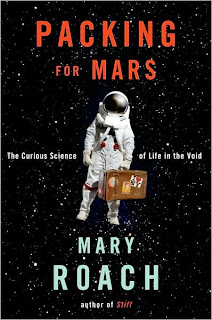Amazon Best Books of the Month, August 2010: With her wry humor and inextinguishable curiosity, Mary Roach has crafted her own quirky niche in the somewhat staid world of science writing, showing no fear (or shame) in the face of cadavers, ectoplasm, or sex. In Packing for Mars, Roach tackles the strange science of space travel, and the psychology, technology, and politics that go into sending a crew into orbit. Roach is unfailingly inquisitive (Why is it impolite for astronauts to float upside down during conversations? Just how smelly does a spacecraft get after a two week mission?), and she eagerly seeks out the stories that don't make it onto NASA's website--from SPCA-certified space suits for chimps, to the trial-and-error approach to crafting menus during the space program's early years (when the chefs are former livestock veterinarians, taste isn't high on the priority list). Packing for Mars is a book for grownups who still secretly dream of being astronauts, and Roach lives it up on their behalf--weightless in a C-9 aircraft, she just can't resist the opportunity to go "Supermanning" around the cabin. Her zeal for discovery, combined with her love of the absurd, amazing, and stranger-than-fiction, make Packing for Mars an uproarious trip into the world of space travel. --Lynette Mong
Space is a world devoid of the things we need to live and thrive: air, gravity, hot showers, fresh produce, privacy, beer. Space exploration is in some ways an exploration of what it means to be human. How much can a person give up? How much weirdness can they take? What happens to you when you can’t walk for a year? have sex? smell flowers? What happens if you vomit in your helmet during a space walk? Is it possible for the human body to survive a bailout at 17,000 miles per hour? To answer these questions, space agencies set up all manner of quizzical and startlingly bizarre space simulations. As Mary Roach discovers, it’s possible to preview space without ever leaving Earth. From the space shuttle training toilet to a crash test of NASA’s new space capsule (cadaver filling in for astronaut), Roach takes us on a surreally entertaining trip into the science of life in space and space on Earth.






